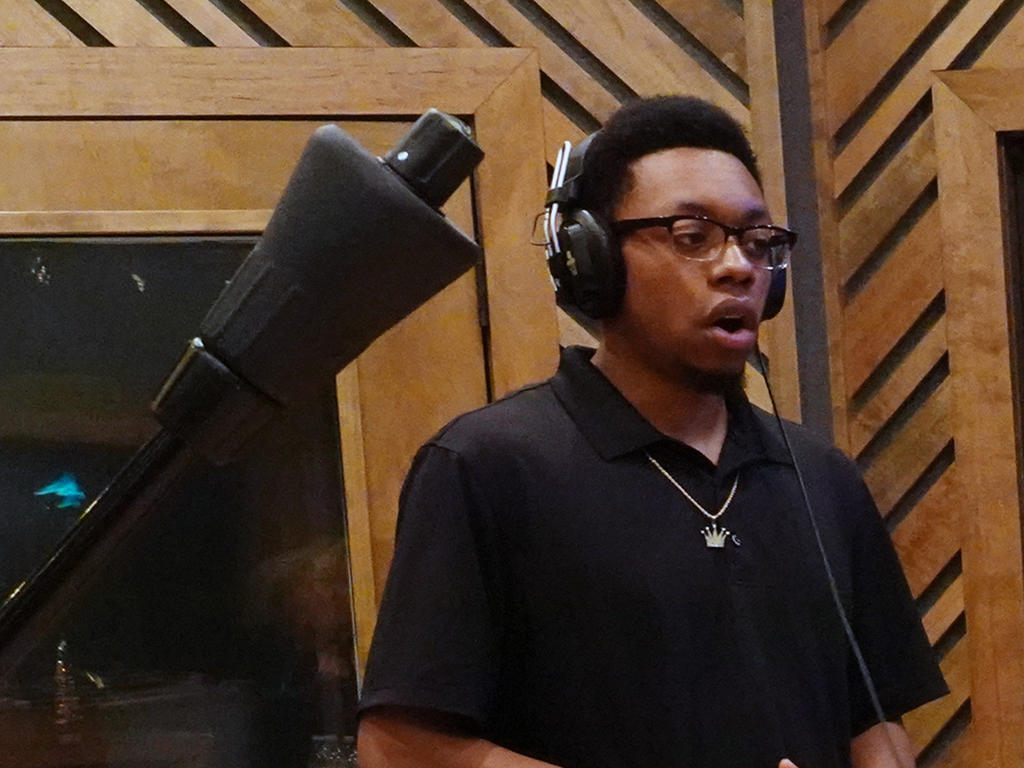From classical to R&B to hip-hop, André Moore, more commonly known as Dré on campus, is a walking symphony of melodies. For his success during his time at Rhodes, the senior vocal performance major likes to give credit to the professors who have been instrumental in his formation as a singer and a producer.
“My voice would not be where it is without Dr. Sandra Franks. She has taught me countless techniques,” says Moore. “Dr. David Shotsberger taught me how to use Ableton, a software music sequencer. Dr. Carol Blankenship guided me through college as my advisor. Dr. Vanessa Rogers has taught me more about African American music than I have ever learned in an academic setting. Dr. Courtenay Harter has pounded music theory into my brain, even when I didn’t want to learn. Without her, I would not be able to write and learn music with the speed and accuracy that I do.”
Moore’s self-produced album—“The Memphis Sound”— debuted in September 2018 and features a mixture of hip-hop, R&B, and soul music. Says Moore, “I’m a classically trained vocalist and a rapper, which is a weird combination. Learning how to switch between genres has helped me to become a more expressive musician no matter what I’m singing. As a producer, being classically trained speeds up the beat-making process in the creation of melodies and harmonies.”
As a participant in Rhodes Institute for Regional Studies, Moore worked on a research project titled “The Memphis Sound: A Journey through a Wave of Music” with Dr. John Bass, the director of Rhodes’ Mike Curb Institute for Music. In addition, he worked with Dr. Charles Hughes of the history department and says, “He has challenged me to understand that music is a creative form of research. Just listening to him speak about how music is light in a world full of darkness inspires me to be more intentional about my music making process.”
Moore also serves as an audio engineer for the Curb Institute and has performed on campus for the annual Curb Block Party, Rites of Spring, and Homecoming concerts, as well as singing with the a cappella group Woolsocks.
“As many people on campus know, André is an incredible performer who is equally adept at singing arias or his own original hip-hop pieces,” says Bass. “What many don’t know about him is that he has been an integral part of the development of the Curb Institute during his time at the college. He is one of the leaders of the audio production area, and he spends so much time helping other people get connected to the program and teaching them how to make better music.”
Instrumentally, Moore has another slew of influences on campus who have impacted his development. “Dr. Tom Bryant, Dr. Brian Ray, Ms. Debbie Smith, and Dr. Kate Stimson have inspired me since the day I saw them place their graceful fingers on the piano,” he says. Moore also has worked with composer and conductor Dr. Evan Williams, who helped him set up his senior recital.
A Memphis native, Moore is a bass section leader at Grace St. Luke’s Church in Midtown. He also serves as bass section leader and co-vice president of the Rhodes Singers, under the leadership of Dr. William Skoog. “For these four years, he has given me vital tips on vocal health,” says Moore, “He also has taught me how to lead a choir, to step up when necessary to conduct music, and so if I ever want to be a teacher, I won’t be clueless when I step into the classroom.”
During the summer of 2017, Moore combined his passions of youth empowerment and education by serving as an intern at the Stax Music Academy through the Rhodes Bonner Scholarship Program. While working at the academy’s intensive music camp for young musicians, Moore says he got a chance to “hang out with the future superstar music geniuses of the world.”
With graduation on the horizon, Moore is looking toward New York City to potentially intern at Tidal, a global music and entertainment platform. “In the meantime,” he says, “I’ll be making music. I have about 70 tracks that haven’t been released.”
By Meg Jerit ’20
